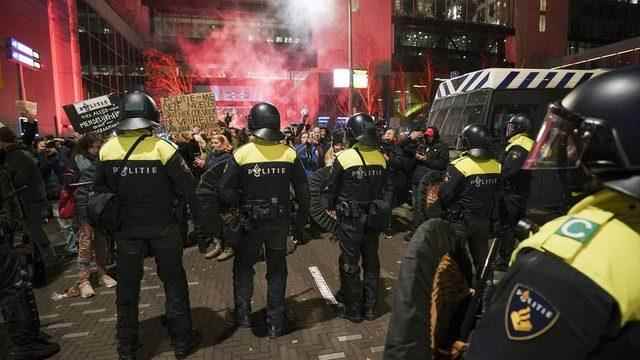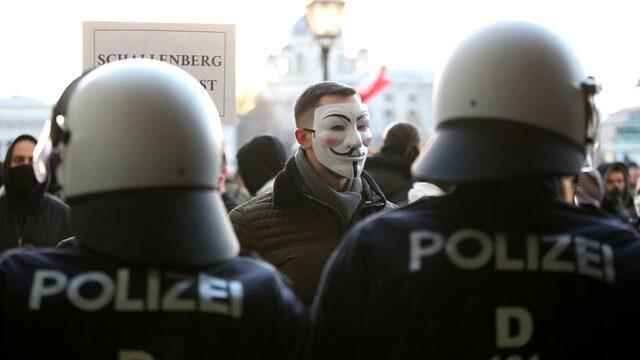Protest demonstrations in many cities in Europe as a reaction against the new Covid measures continue. Various groups will hold demonstrations in the streets this weekend in Austria and the Netherlands.
Violence took place in the demonstrations held in these two countries last week and the police intervened.
While questioning the decisions taken by politicians regarding the Covid epidemic and the opinions about the virus in which scientists are in agreement, the demonstrators voice their concerns on the streets and on their social media accounts.
On the other hand, many conspiracy theories and misinformation spread through these protests.
Some argue that the Covid vaccine program is a conspiracy to poison people, while others describe governments as “dictatorships”.
We see the spread of more radical views, not just reactions to political decisions, both on social media platforms and in crowds.
So, who are the participants in the Covid protests in Europe, and what ideas are they affected by?
Influenced by radical political views
The far-right Freedom Party of Austria (FPÖ), the third largest party in the Austrian Parliament, strongly opposes the Covid measures. The new leader of the party, Herbert Kickl, described the vaccine program as a genetic experiment and also expressed other false and misleading views.
The newly formed political formation called People, Freedom, Fundamental Rights (MFG), which is composed of anti-vaccination opponents in the country, made statements that draw parallels between Covid restrictions and the Nazi administration through expressions such as “dictatorship” and “apartheid regime”.
The MFG also spearheaded the organization of recent protests in the country.
On the other hand, it is seen that the opposition voices against the Covid restrictions in the country are not limited to far-right formations.
According to a study by the BBC Monitoring Service, there are left-wing groups and organizations among the opposition voices against measures such as Covid passports or curfews.
For example, some left-leaning media outlets made groundless claims that the travel card application, which obliges people to present a vaccine or negative test results for international travel, was created by the “elite” of the financial world.
Those who do not trust the government
According to a recent study commissioned by the European Union (EU), there is a strong connection between a lack of trust in the Covid vaccine in Austria and a general lack of trust in those in power.
As a result of the research, it was determined that trust in the government decreased significantly between the spring of 2020 and 2021, when the pandemic emerged in Austria and Croatia, among the countries where these protests were held.
In Russia, where protest demonstrations without approval from the government are not allowed, the loss of confidence in the government may not be on the streets, but it is clearly visible on the internet and social media.
Olga Diakonova of the BBC Russian Service points out that the social media reaction to vaccination certificates is not independent of the problem of trust in the government and authorities.
As a matter of fact, Russia is one of the countries with the lowest number of vaccinated people in Europe.
Expressions such as “against fascism” and “genocide” were prominent on some of the banners carried by the demonstrators during the protests held in Kiev, the capital of Ukraine, at the beginning of this month.
The fact that the same banners were carried by the demonstrators shortly after that in Moldova was interpreted by the local media as that the same people may have designed the banners.
Fears that the government is interfering with people’s fundamental rights are not unreasonable in many of these countries, especially given the recent rise of authoritarian political regimes to power.
But those with legitimate concerns do not make up the majority of these protesters, according to Miro Dittrich of the German think tank CeMAS. Dittrich points out that the organizers of the demonstrations are largely fed by far-right views or conspiracy theories.

Those caught in distorted information about Covid on the Internet
While some legitimate questions have been raised about practices such as compulsory vaccination and vaccination documents that may cause discrimination, many false and misleading information is circulating in social media groups where street protests are organized.
It is noteworthy that in a social media group that supports the protests in the Netherlands, baseless claims have been made, such as that vaccines are poisonous and that they are part of a global conspiracy.
Likewise, social media groups in Austria are making false claims that vaccines are becoming more and more “ineffective”. However, these claims contradict the landscape revealed by regular Covid tests and what happens in practice, because there is evidence that Covid vaccines protect billions of people around the world.
Of course, no medicine or vaccine is completely risk-free, but considering how Covid puts people’s lives in danger, from the youngest to the elderly, the rare side effects and complications are not as serious as the risk posed by the virus.
Despite this, the social media posts in question underestimate the risk of the virus, while exaggerating the risks posed by the vaccine.
Ciaran O’Connor, a researcher at the Institute for Strategic Dialogue, which tracks disinformation and radical views on the Internet, said: “Of course, there are many people who feel genuinely intimidated by the restrictions in their own countries. However, the danger posed by such demonstrations, groups or movements, radicalization or It also comes from the fact that they can lead people to extremist views because the source of the views they defend is information pollution, deceptive claims and conspiracy theories.
this news *Marianna SpringPrepare with the support ofndi*.
